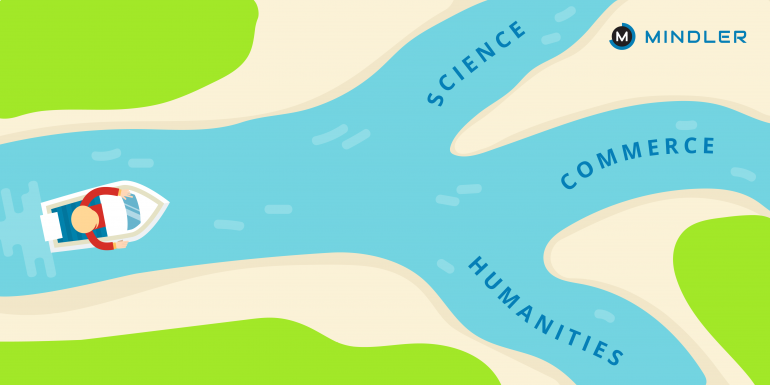For most students in class 9th and 10th, visions of a career path are mostly restricted to childhood dreams.
“I’ll grow up to be a pilot…a teacher…a doctor!”
Ever since those early flights of fancy, very few actually give their career choice a serious thought.
Yet as class 9th ends or class 10th begins, all of a sudden, this question starts coming up in a big way. Parents, family, teachers (sometimes even friends) can’t stop talking about how you need to choose your stream after class 10th and that it is time you start deciding.
Now, you haven’t even started thinking about your career or stream yet, how are you supposed to choose a stream that’s going to be there with you for 2 years, and a career that may stay with you for the rest of your life?
Alright, let’s not panic here. Stream choice can seem like a daunting task, but it is actually not that difficult if you are aware of your options and engage in a bit of diligent research and introspection.
The best thing to do is to take it a step at a time. So, why not start with the basics? Let’s first look at what stream choice is all about, and the streams in class 11 CBSE, along with the subjects offered in each.
Boards available in class 11th
CBSE Board: According to CBSE’s official system, class 11 and 12 is integrated course in which students may pick from a maximum of 9 subjects and a minimum of 5. Students may pick any combination of one language and four electives as long as they are available at the university.
IGCSE Board: If you are enrolled in an IGCSE school, you must pick a minimum of five subjects to be able to take the class 11 examinations.
CISCE Board: CISCE (ICSE exams for class 10 and ISC exams for class 12) normally needs applicants to pick their topics in class 9 as a basis for classes 11 and 12. In class 11, you may chose from five optional topics in addition to English.
State Boards – These boards offer pre-university education to state schools and colleges (PUC). This is a two-year board exam system in which state education administers board examinations to students in grades 10 and 12. Math, physics, history, geography, economics, and other disciplines are taught by state boards in the same manner as they are taught by CBSE. Students must chose four disciplines and two languages. The single difference is the choice of the first language, which varies by state and is generally the state’s native language with English as a second language.
Which is the best stream for class 11?
CBSE offers 3 stream options that determine the subjects you will study in your class 11th and 12th and the career options you would ultimately have in the future.
The 3 streams in class 11 CBSE are:
- Science stream
- Commerce stream
- Arts stream/Humanities stream
Let’s look at each of them in detail.
1. Science: The Study of the Physical and Natural World
This is one stream that most of you would have a fair bit of idea about. Not just because everyone studies science subjects till class 10th at least, but also because this is a stream people can’t seem to stop talking about. From statements like, “Go for the science stream so that you can become an Engineer or a Doctor” to even “You are good at academics, you would be thinking of opting science, I’m sure?”
While these notions hardly hold a candle to reality, chances are you would have some type of understanding about what the science stream entails.
The Science stream, as I mentioned above, relates to the study of the physical and natural world through the study of pure sciences and their applications in the real world. From understanding how the laws of gravitation govern planetary motion to learning about the structure of the atom, you will uncover the many mysteries of the world around us.
Thus, innate curiosity and keenness to explore, coupled with a logical thinking ability are essential to be successful in this stream.
What are the subjects in Science in class 11?
The science stream has two sub-branches, divided based on the third subject you study:
- Medical – Physics, Chemistry, Biology, English, Optional Subject
- Non-Medical – Physics, Chemistry, Maths, English, Optional Subject
Physics and Chemistry are common to both the branches and the primary difference lies in whether you opt for Mathematics (PCM) or Biology (PCB). However, students sometimes go with a combination of the two (PCMB), choosing to study Mathematics in place of the optional subject. A PCMB combination has its own pros and cons, and it is a decision you should take only after careful consideration.
While the first 4 subjects are tied to the stream you choose and are compulsory for all students to study, CBSE gives you a choice for your 5th subject or optional subject.
The board offers many choices, but the most commonly-opted for optional subjects with science are:
- Medical – Psychology, Biotechnology, Mathematics, Economics, Home Science, Fine Arts, Physical Education
- Non-Medical – Computer Science, Economics, Physical Education, Engineering Drawing, Fine Arts, Psychology
Recommended Read: Every Question About Opting for a 6th Subject in Class 11th, Answered
Which career options do you have with the Science Stream?
Although the medical branch has been so named because it opens a pathway to a career in Medicine after class 12th, don’t be misled by the name thinking that is all there is to it. There are many alternate careers and routes available with the stream if you decide to go that way.
From options in the biological and life sciences, such as Zoology, Botany, Microbiology, Biochemistry, to options in allied fields like Nutrition, Pharmacology, Psychology, Biotechnology, etc., there is a lot of options for you to explore. Apart from these, those interested in medicine, yet not willing to go the standard MBBS route can even explore alternate branches of medicine (like Dentistry, Ayurveda, Homeopathy, etc.) or allied medicine fields (like Physiotherapy, Clinical Research, Audiology, etc.)
Read More: Career Options for PCB Students
Similarly, popular opinion dictates that Engineering is the only option (or the only suitable option) for PCM students. Well, that is definitely not the case. Non-medical students can build their careers in a wide range of exciting fields such as Architecture, Aviation, Statistics, Defense, Design, Ethical Hacking, Merchant Navy, Computer Applications, Physics, Chemistry, and the list goes on.
Read More: Career Options for PCM Students
Highest Salary Jobs In Science Stream (Non-Medical) For Freshers:
| Job Title | Average Salary (Annual, INR) | Skills Needed |
| Data Scientist | ₹8,00,000 | Statistical analysis, programming, machine learning |
| Software Developer | ₹6,00,000 | Programming languages, software development, problem-solving |
| Environmental Scientist | ₹5,50,000 | Environmental research, data analysis, communication |
| Aerospace Engineer | ₹5,00,000 | Aerospace engineering, problem-solving, teamwork |
| Geoscientist | ₹4,50,000 | Geology, data analysis, fieldwork |
| Data Analyst | ₹4,00,000 | Data analysis, data visualization, SQL |
| Chemical Engineer | ₹4,00,000 | Chemical processes, problem-solving, project management |
| Renewable Energy Engineer | ₹3,50,000 | Renewable energy systems, engineering principles, problem-solving |
| Environmental Engineer | ₹3,50,000 | Environmental engineering, pollution control, project management |
| Civil Engineer | ₹3,00,000 | Civil engineering principles, construction knowledge, project management |
Highest Salary Jobs In Science Stream (Medical) For Freshers:
| Job Title | Average Salary (Annual, INR) | Skills Needed |
| Surgeon | ₹15,00,000 | Surgical skills, attention to detail, decision-making |
| Neurologist | ₹12,00,000 | Clinical knowledge, diagnostic skills, patient management |
| Cardiologist | ₹10,00,000 | Cardiology expertise, diagnostic skills, patient care |
| Orthopedic Surgeon | ₹10,00,000 | Orthopedic surgery skills, diagnostic abilities, patient care |
| Dermatologist | ₹9,00,000 | Dermatology expertise, diagnostic skills, patient care |
| Anesthesiologist | ₹8,50,000 | Anesthesia administration, critical care, attention to detail |
| Pediatrician | ₹8,00,000 | Pediatric care, diagnostic skills, communication |
| Gastroenterologist | ₹7,50,000 | Gastroenterology expertise, diagnostic skills, patient care |
| Radiologist | ₹7,00,000 | Radiology knowledge, imaging interpretation, attention to detail |
| Ophthalmologist | ₹6,50,000 | Ophthalmology expertise, diagnostic skills, patient care |
2. Commerce: The Study of Trade and Business
The next in line, Commerce is not without its own associated myths. The most popular ones being, “Commerce is good for average students who cannot get into science” or “Commerce is only suitable for students from business families.”
These are again a far cry from the truth. Commerce is a field that relates to the study of business, trade and finance. Commerce students study how goods and services are exchanged, how businesses operate, how financial transactions occur, how the economy of the country works, and more. The indispensability of commerce and its related careers to our day-to-day living makes it a lucrative field to explore, and one with a wide choice of career options too.
While you may or may not choose to study Mathematics as part of Commerce, numbers form the base for this stream. A strong hold over calculations and fundamentals of maths, and the ability to deal with large amounts of data are critical elements of success in the commerce stream.
Recommended Read: Stream Selection after 10th: Choosing the Right Optional Subject
What are the subjects in Commerce in class 11?
Commerce is a stream that students generally have the least idea about since its three main subjects are new to most students.
The following are the subjects you are required to study: Accountancy, Business Studies, Economics, English, Mathematics (or optional subject)
Accountancy as subject covers concepts related to the managing of the income and finances of a business or an individual. You study topics like transactions, expenditure, cash books, memos, trial balance, trading, profit, etc. and learn how to make a balance sheet.
On the other hand, as part of Business Studies, you study about the types of businesses and organizations, differences between private and public sector companies, models of business, business finance, international trade, etc. For Economics, you study about Indian economic development, statistical tools, demand and supply, government budget and economy, etc.
For the fifth subject, the board gives a choice between Mathematics and other elective subjects. Thus, if you are not very comfortable with maths, you can choose not to study it.
The optional subjects available with the Commerce stream are:
Informatics Practices, Physical Education, Computer Science, Multimedia and Web Technology, Entrepreneurship, Legal Studies, Psychology and Fine Arts
Recommended Read: What are the Subjects Offered in the Commerce Stream in Class 11?
Which career options do you have with the Commerce Stream?
The commerce stream is a popular choice amongst students looking to build their career in the fields of accounting, banking, finance and related areas. With the right knack for numbers and data, you can build a highly lucrative and financially rewarding career in these fields.
The major and popular career options for commerce students after 12th include Chartered Accountancy (CA), Company Secretary (CS), Actuarial Science, Management, Economics, Bank PO, Investment Banking, Stockbroking, Finance, Entrepreneurship, Law, Hotel Management, and many more.
Read More: Career Options for Commerce Students
Highest Salary Jobs In Commerce Stream For Freshers:
| Job Title | Average Salary (Annual, INR) | Skills Needed |
| Investment Banker | ₹10,00,000 | Financial analysis, valuation, communication |
| Chartered Accountant | ₹8,50,000 | Accounting principles, taxation, audit, analytical skills |
| Financial Analyst | ₹7,50,000 | Financial modeling, data analysis, investment research |
| Actuary | ₹7,00,000 | Statistical analysis, risk assessment, mathematical modeling |
| Management Consultant | ₹7,00,000 | Strategic planning, problem-solving, project management |
| Risk Manager | ₹6,50,000 | Risk assessment, mitigation strategies, analytical skills |
| Tax Consultant | ₹6,00,000 | Taxation laws, compliance, analytical skills |
| Business Analyst | ₹5,50,000 | Data analysis, requirements gathering, problem-solving |
| Financial Planner | ₹5,00,000 | Financial planning, investment knowledge, client management |
| Stockbroker | ₹4,50,000 | Stock market analysis, trading strategies, communication |
3. Humanities: The Study of Human Society and the World
Humanities as a domain have been widely misunderstood and disregarded in the past, but as we complete the second decade of the 21st century, things are changing fast. Not considered as a stream for academically weak students anymore, more and more students are looking to opt humanities for the wide range of subject and career options it provides.
Humanities is a very broad domain that covers areas related to the human society, relationships, culture and systems. These fields help you gain a deeper understanding of how the world and society around us work and how human society, laws and norms have evolved over time. From the study of how people interact in group settings to the study of the legal rights of citizens, everything comes under the purview of humanities.
Students who are aware and curious to learn about world affairs, social issues, historical events and society are the ideal fit to explore humanities as their stream in class 11th and 12th.
Recommended Read: How Nitya Overcame her Inhibitions and Biases to Choose the Stream Best Aligned to her Career Goals
What are the subjects in Arts/Humanities in class 11?
As opposed to science and commerce which offer a small window of choice (mainly in choosing the optional subject), humanities offers students plenty of choice in their subjects.
You can choose from a range of main subjects including History, Political Science, Economics, Geography, Sociology and Psychology.
Some schools allow students to take up these subjects in any combination they like, while others provide more fixed choices, such as choosing between Geography and History, Political Science and Economics, etc.
Optional Subjects with Humanities include: Maths, Home Science, Legal Studies, Fine Arts, Physical Education, Media Studies
Humanities with Mathematics is another combination that is becoming popular with students these days. Keeping maths as your 5th or 6th subject opens up career options for you in Economics, Business and Finance.
Recommended Read: What are the Subjects Offered in the Humanities Stream in Class 11?
Which career options do you have with the Arts/Humanities Stream?
The most prevalent myth about the humanities stream is that it has limited career options available after 12th. And why not, what can one even do with subjects like History and Geography anyway? Well, this statement just emphasises how less aware most people are about humanities.
Many highly lucrative and sought-after career options lie ahead of humanities students once they clear their class 12th. Design, Law, Psychology, Economics, Management, History, Archaeology, International Relations, Hotel Management, Event Management, Mass Communication, Journalism, Civil Services, Social Work, Sociology, Photography, Fashion Communication, Content Writing, are a few of the possible fields available due to the wide applicability of humanities.
Read More: Career Options for Humanities Students
Not just that, there are more and more new fields also coming up in the humanities domain, a few fields that did not even exist a few decades back. These include fields such as Gerontology, Public Policy, Habitat Policy and Practice, Gender Studies, Rural Studies and Development, Museology, and Art Restoration, etc.
Read More: Upcoming Careers for Humanities Students
Highest Salary Jobs In Arts Stream/Humanities Stream For Freshers:
| Job Title | Average Salary (Annual, INR) | Skills Needed |
| Lawyer | ₹8,00,000 | Legal knowledge, critical thinking, communication |
| Content Writer | ₹6,00,000 | Writing skills, creativity, research abilities |
| Public Relations Manager | ₹5,50,000 | Communication, media relations, strategic planning |
| UX Designer | ₹5,00,000 | User experience design, wireframing, problem-solving |
| Social Media Manager | ₹4,50,000 | Social media marketing, content creation, analytics |
| Human Resources Manager | ₹4,50,000 | Recruitment, employee relations, organizational skills |
| Market Research Analyst | ₹4,00,000 | Research skills, data analysis, market trends |
| Graphic Designer | ₹4,00,000 | Graphic design software, visual communication skills |
| Event Manager | ₹3,50,000 | Event planning, organization, multitasking |
| Journalist | ₹3,50,000 | Newsgathering, writing, investigative skills |
FAQs about stream selection in class 11:
1) What is the importance of selecting your stream?
A) Choosing the proper stream is vital as it establishes the framework for your future academic and professional path. It decides the courses you’ll study and the possibilities accessible in certain professions, enabling you specialize in areas fit with your interests, talents, and long-term ambitions.
2) Which stream do most students choose?
A) In many educational institutions, a considerable percentage of students select the scientific stream, followed by business and finally the arts/humanities stream. However, the choice of stream differs among areas and individual tastes.
3) Do marks matter in stream selection?
A) While academic achievement may play a part in stream selection, it’s not the single deciding factor. It’s crucial to assess your interests, talents, and future objectives to make an educated selection. Seek help from mentors, examine your possibilities, and make a decision that resonates with your passion.
4) How do I choose which stream to take in 11th?
A) To pick the correct stream, analyse your interests, talents, and professional ambitions. Research the topics and job routes linked with each stream, confer with instructors, parents, and experts, and consider aptitude tests to acquire insights into your tendencies.
5) What advice would you give to class 11 students?
A) Explore numerous disciplines, engage in extracurricular activities, and seek help from mentors. Keep an open mind, pursue your passion, and work hard. Remember that your stream decision in class 11 is not the only predictor of your future; you may always make career changes depending on your interests and talents.
6) Can I change my stream in class 11 mid term?
A) Stream change rules differ between educational systems and institutions. Some enable stream updates within a set window, while others may have constraints. Consult your school or educational board to learn the criteria and processes for stream modifications in your unique setting.
7) What subject should I take in 11th class?
A) The choice of studies in class 11 should be based on your interests, strengths, and future ambitions. Consider your hobbies and professional ambitions to make an educated selection that corresponds with your long-term aims.
How To Choose The Best Stream For Class 11?
Here are five steps to help you pick the best stream in class 11:
1) Self-reflection: Reflect on your interests, strengths, and professional objectives. Consider topics you love, abilities you excel in, and prospective career routes you are enthusiastic about. This self-assessment will give a basis for making an educated choice.
2) Research and explore: Gather knowledge on the numerous paths accessible, such as science, commerce, and arts/humanities. Research the courses, curricula, and job options connected with each stream. Talk to professors, professionals, and people working in different sectors to acquire insights on their experiences.
3) Seek guidance: Consult with instructors, parents, and career counselors who may give helpful advice and direction. Discuss your hobbies, aptitudes, and objectives with them, and ask for their advice and ideas. Their skills and understanding can help you make an educated selection.
4) Consider future goals: Consider your long-term objectives and the prerequisites of possible vocations. Some jobs may have unique topic requirements or preferences. Assess if a certain stream matches with your planned career path and the requirements for further study in that sector.
5) Keep options open: Remember that your choice of stream in class 11 is not binding for the rest of your life. While it’s vital to make an educated choice, it’s also good to be flexible and change as you advance. Keep an open mind and be prepared to explore and switch streams if required, depending on your growing interests and ambitions.
By following these steps, you may make an educated selection and pick the stream that best matches your interests, talents, and future objectives.
Conclusion:
As you stand on the verge of class 11, preparing to start on a new chapter of your academic adventure, the issue of which stream is best may weigh heavy on your mind. But worry not, because this choice is not about choosing a single “best” stream, but rather identifying the one that corresponds with your individual hobbies, abilities, and objectives. Trust in yourself, listen to your emotions, and select the stream that sets your soul on fire. Remember, it’s not about complying to cultural standards or pursuing the illusion of perfection; it’s about finding pleasure and satisfaction in the pursuit of knowledge.
Recommended Read: It’s Not the End: 6 Things to Do If You Couldn’t Score Well in Board Exams
Which stream are you leaning towards the most? Share with us in the comments below!









